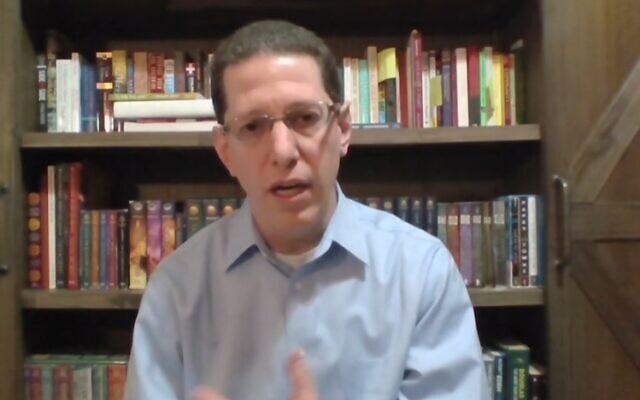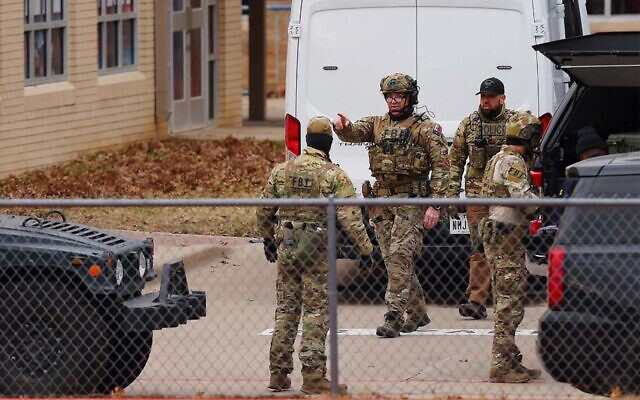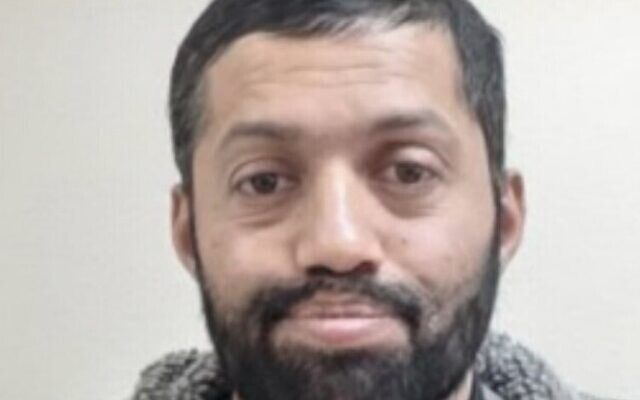Recalling ‘terrifying’ final moments of standoff, Charlie Cytron-Walker says he checked to see the other hostages with him were ready before springing into action, fleeing

COLLEYVILLE, Texas — Rabbi Charlie Cytron-Walker, among four people held at gunpoint during Shabbat morning services at his Congregation Beth Israel, said he and the remaining hostages managed to flee the scene after he hurled a chair at the attacker.
In his first TV interview since the 11-hour standoff in Colleyville, Texas, Cytron-Walker told CBS that he and the others grew “terrified” during the last hour of the ordeal when the attacker — Malik Faisal Akram — “wasn’t getting what he wanted.”
“It didn’t look good. It didn’t sound good,” he said.
“When I saw an opportunity when he wasn’t in a good position, I made sure that the two gentlemen who were still with me, that they were ready to go, the exit wasn’t too far away.
“I told them to go, I threw a chair at the gunman, and I headed for the door. And all three of us were able to get out without even a shot being fired,” Cytron-Walker said.
Akram was subsequently killed in a firefight with the FBI’s Hostage Rescue Team, according to his family.
Footage of the moment when FBI rescued the hostages at this Texas Synagogue. The hostage taker has been identified as a 44 year old British Islamist who had recently traveled to US. He is not the brother of Pakistani Al Qaeda terrorist Aafia Siddiqui. Investigations are ongoing. pic.twitter.com/omJxITvU4b
— Aditya Raj Kaul (@AdityaRajKaul) January 16, 2022
The CBI spiritual leader said he was “still processing” what unfolded and that “it’s completely overwhelming.”
He credited his rabbinic training that emphasized being “a calm, un-anxious presence” in difficult moments.
Cytron-Walker was asked to recall his decision to welcome Akram inside of CBI, giving him a cup of tea after the 44-year-old British national knocked on the synagogue’s glass door.
“When I took him in, I stayed with him. Making tea was an opportunity for me to talk with him,” he recalled. “In that moment, I didn’t hear anything suspicious. Some of his story didn’t quite add up, so I was a little bit curious, but that’s not necessarily an uncommon thing.”
It wasn’t until later, when prayers had started, that the rabbi understood what Akram had come to do.
“It was during prayer… and my back was turned — we face toward Jerusalem when we pray… I heard a click. And it could have been anything. And it turned out that it was a gun,” Cytron-Walker said.

Akram threatened the rabbi and the other three hostages throughout the 11 hours that followed, Cytron-Walker said, though he let one of them go midway through.
Akram’s demand during the standoff was for US authorities to release Aafia Siddiqui, a Pakistani national imprisoned at Carswell Air Force Base, roughly 15 miles southwest of Colleyville. Known to law enforcement as “the Lady of Al-Qaeda,” Siddiqui was convicted in 2010 by a New York City federal court of attempting to kill US military personnel. She is currently serving an 86-year sentence, but her brother issued a statement through the Council on American-Islamic Relations condemning the attack at Congregation Beth Israel.
In addition to his rabbinic training, Cytron-Walker also credited the courses and instruction he had received from the FBI, the Colleyville Police Department, the Anti Defamation League and the Secure Communities Network. “They teach you [that] in those moments when your life is threatened, you need to do whatever you can to get to safety, you need to do whatever you can to get out.”
The CBI rabbi did not hesitate when asked if he planned to return to his synagogue after the harrowing ordeal. “It’s something that we are definitely going to do.”
“Unfortunately we’ve experienced great difficulty and challenges as a people. And at the same time, we’ve experienced great resilience. It won’t necessarily be an easy thing, but it’s a really important thing,” he continued. A synagogue is… called the Beit Knesset (in Hebrew). It’s a house of assemblies. It’s a place where we gather as a community. It’s a place where we pray together.”

Cytron-Walker said he was grateful that only three people were with him at the start of the standoff, referencing the decision made by most Reform and Conservative synagogues to offer online services for members since the start of the pandemic.
“I just want to give thanks and appreciation for all of the love and all of the support from the Jewish community, my people, from the Muslim community, from the Christian community, from all faiths, all backgrounds — friends, acquaintances, strangers, all over the world. It’s truly been overwhelming. Thank you so much,” he said.
Cytron-Walker is known in the community for his interfaith work. As the hostage crisis unfolded, Jewish, Muslim and Christian spiritual leaders gathered at a nearby church to pray together and provide support to law enforcement and relatives of those being held inside CBI.
As reported by The Times of Israel
